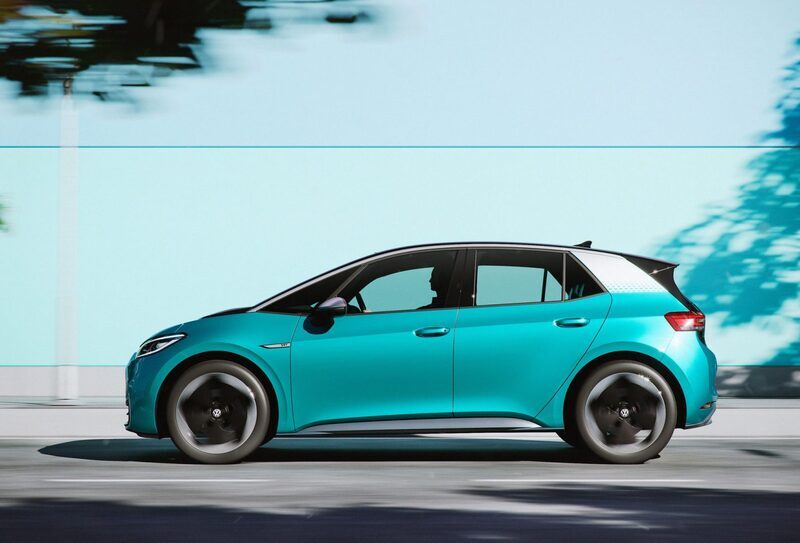
UNEP chief: Nearly 3 bn people face water scarcity.. Over 90% of disasters are water-related
Nearly three billion people face water scarcity. Over 90 percent of disasters are water-related, including ...

Volkeswagen will introduce its ID.3 electric car in the summer with an aim to make e-mobility affordable and money-saving.
Over the next few years, Volkswagen intends to become the world market leader in e-mobility and is investing €33 billion for this purpose throughout the Group up to 2024. Of this figure, €11 billion will be invested by the Volkswagen brand. The Group is forging ahead with the largest electric offensive in the automotive industry.
Deliveries of the compact ID.3 will start in the summer and the world premiere of the ID.4 will also take place this year. In addition, the production of Volkswagen’s new electric car generation in China will start at the end of the year.
The basic version of the ID.3 will be less expensive in Germany in terms of acquisition and operation than comparable internal combustion models. As regards operating expenses alone, ID.3 drivers in Germany will save about €840 per year.
“With the ID.3, the electric car will finally become affordable. This model is entirely fit for everyday use and even costs less than an internal combustion model thanks to the environmental bonus,” says Thomas Ulbrich, Member of the Board of Management of the Volkswagen brand responsible for E-Mobility.
Currently, preparations for the delivery of the ID.3 are well underway. “The time schedule will be met,” Ulbrich confirms. ”The ID.3 will be introduced to the market in the summer, as announced.”
In the ID.3, Volkswagen has developed a completely innovative electric car. This will be the first updatable electric car from Volkswagen based on the modular electric drive toolkit (MEB).
During production, the current software version will initially be transferred to the vehicle.
Over subsequent months, the digital functions will be regularly updated. The objective is to deliver the 30,000 pre-booked ID.3 vehicles in the 1st Edition to customers throughout Europe at almost the same time.
The cost of ownership analysis shows that, in terms of acquisition and operation expenses, an ID.3 is less expensive, depending on the model variant, than a comparable internal combustion engine model.
The basic version with a range of 330 kilometers costs less than €23,430 in Germany, following deduction of the environmental bonus.
It is therefore at least as inexpensive as comparable models such as the Golf Life. In addition, ID.3 drivers in Germany save about €840 per year on operating expenses.
Among other items, there is no road vehicle tax, no oil changes are required and the ID.3 is assigned to a less expensive insurance class (class 17). Energy costs are also lower.
Silke Bagschick, Head of Sales and Marketing, e-mobility Product Line, says: “The price is no longer an argument against but rather an argument for the electric car. Leasing offers make the changeover easy and reduce uncertainty. In future, the electric car will also be attractively priced even without subsidies.”
Like the ID.3, the next ID. model from Zwickau is also to be offered with a neutral carbon balance. Volkswagen will be bringing the first electric SUV produced with a neutral carbon balance onto the roads with the ID.4, Ulbrich announced in Berlin: “With the ID. family, we are showing that clean mobility as possible. The best thing is that driving an electric car not only protects the environment and your bank balance but is also enjoyable. I am very much looking forward to bringing the ID.3 to our customers in the summer.”
Volkswagen is reducing CO2 emissions in the production of the ID. family. For example, the electric car plant at Zwickau uses power from renewable sources. Battery cells in Europe are also produced using green power.
The entire manufacturing process and the delivery chain are continually reviewed to identify CO2 savings potentials. Volkswagen offsets any emissions which are currently still unavoidable by investing in recognized climate protection projects such as the Katingan Metaya Forest Protection Project.
Furthermore, Volkswagen offers its customers a number of possibilities of charging their electric cars with climate-friendly power. For charging at home, CO2-free Volkswagen Naturstrom is available.
On the roads, the fast charging parks of the IONITY joint venture offer 100 percent eco-power – just like charging stations at the Volkswagen plants.
Nearly three billion people face water scarcity. Over 90 percent of disasters are water-related, including ...
IFC announced a financing package for Egypt’s leading private sector bank, CIB, to strengthen the ...
The COP29 Presidency of Azerbaijan today announced the agreement of the Baku Finance Goal (BFG), ...


اترك تعليقا